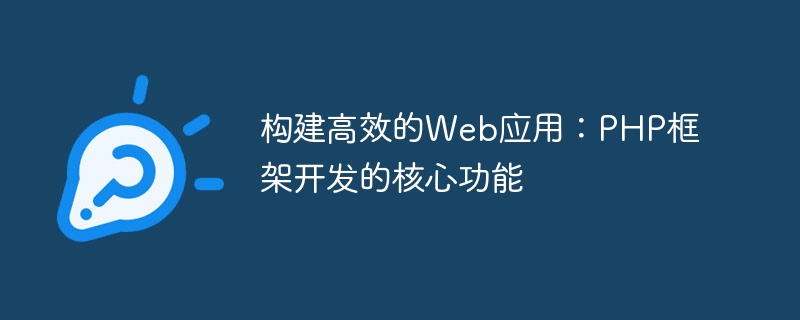

Build efficient Web applications: core functions of PHP framework development
With the rapid development of the Internet, Web applications are becoming more and more common. How to improve the development of Web applications? Efficiency and performance have become the focus of developers. PHP, as a popular server-side scripting language, is widely used in the field of web development. The PHP framework is a software architecture that can provide an efficient development environment and tools. It is one of the important tools for building efficient web applications. This article will introduce the core functions of PHP framework development to help developers build efficient web applications.
The routing function of the PHP framework refers to mapping URL requests to the corresponding processing logic or controller. Through the routing function, developers can easily define URL patterns and corresponding processing methods. This improves application maintainability and scalability while providing a better user experience.
For example, a request with a URL of "/user/1" can be mapped to a controller that handles user information and passes the user ID of 1. In this way, developers can implement different business logic processing based on different URL requests.
PHP framework usually provides a database abstraction layer to enable developers to interact with the database more conveniently. The database abstraction layer provides an easy-to-use API and encapsulates the details of database operations, allowing developers to focus more on the implementation of business logic without having to worry about underlying database connections and query operations.
The database abstraction layer can also improve the efficiency and security of database operations by optimizing and security checking query statements. For example, preventing SQL injection attacks and optimizing the execution plan of query statements to improve application performance.
The template engine is one of the common functions in the PHP framework, which allows developers to separate processing logic and page display. The template engine decouples dynamic data from static templates, allowing front-end and back-end development to be carried out in parallel and easier to modify and maintain.
Through the template engine, developers can use the template language to write web page templates to generate the final HTML page. This approach not only improves development efficiency, but also provides a more flexible interface design and better front-end performance.
Form validation and data filtering in web applications are very important security measures. PHP frameworks usually provide form validation and data filtering functions to help developers easily process user-submitted data and check the legality of the data.
The form verification function can verify whether the form data submitted by the user conforms to the expected format, such as checking whether the email address is legal, whether the password is strong, etc. The data filtering function can filter the data submitted by users to prevent malicious code injection and attacks.
In order to improve the performance and response speed of web applications, PHP frameworks usually provide caching functions. The caching mechanism can store some calculation results or database query results in memory or other high-speed storage media so that they can be quickly obtained the next time you access them.
The caching mechanism can reduce the number of accesses to databases and other external resources, thereby improving the performance of web applications. For example, cache frequently accessed page fragments on the server to avoid regenerating them on every request.
Summary:
The core functions of PHP framework development can provide an efficient development environment and tools to help developers build efficient Web applications. Functions such as routing functions, database abstraction layers, template engines, form validation and data filtering, and caching mechanisms can improve development efficiency and enhance application security and performance. By properly using the core functions of the PHP framework, developers can more easily implement complex business logic and user needs, and provide a better web application experience.
The above is the detailed content of Building efficient web applications: core features of PHP framework development. For more information, please follow other related articles on the PHP Chinese website!




